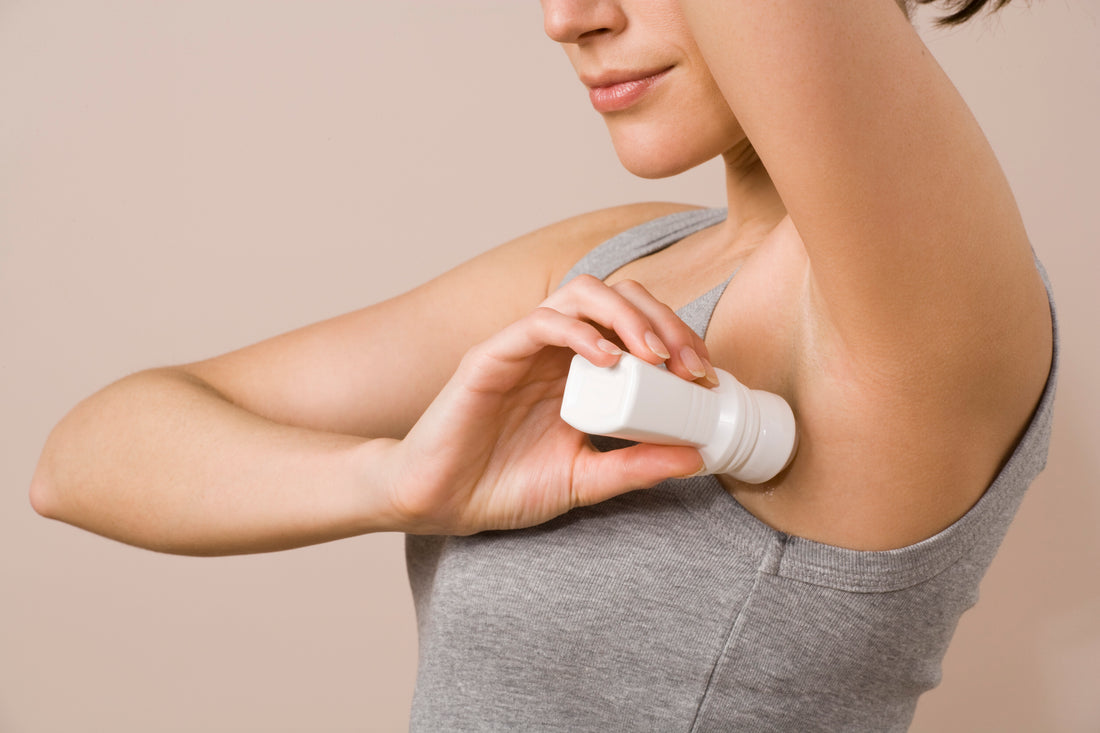
Commercial deodorants and antiperspirants are designed to keep you sweat and odor free all day long, and they typically do their job well. But what effect do their active ingredients have on your health? Let’s take a closer look at the most common culprits and their side effects.
Aluminum
Aluminum might keep you from sweating, but prolonged exposure to this ingredient may not be good for your health. Aluminum compounds found in antiperspirants literally act as a plug in your sweat glands to stop the flow of sweat. This can result in an accumulation of toxins in your pits, as they are not able to be released. Research shows that these compounds are also absorbed and stored in fat cells, which are prevalent in the underarm area. On top of that, there are hormone receptors in this area which could have a reaction with these compounds, resulting in endocrine disruption. These estrogen-mimicking compounds quite possibly promote the growth of cancer cells.
Parabens
Parabens are a common preservative that have been used in many personal care products for the last 70+ years. They are another estrogen-mimicking compound that disturbs the body’s hormonal balance and may promote cancer growth. A study in 2004 linked parabens to breast cancer. This is definitely something you want to avoid in your skincare!
Triclosan
Triclosan is added to skincare products to prevent bacterial contamination, while also killing good and bad bacteria on the skin’s surface, disrupting the skin’s microbiome. It’s common in anti-acne products, hand soaps and deodorants. It has a high potential to irritate the skin and cause contact dermatitis. Some studies have linked Triclosan to unusual hormone activity. Triclosan is classified as a pesticide by the FDA.
Propylene Glycol
Propylene Glycol is another common ingredient in personal care products, food items, pharmaceuticals, and e-cigarettes. It is also used in many other commercial applications, such as in aircraft de-icing fluid. In personal care products, it can cause delayed allergic reactions, contact dermatitis, and is considered a neurotoxin. In deodorants it’s used as a penetration enhancer, which means it increases the ability of other ingredients in your deodorant to go deeper into the skin, increasing their ability to reach the bloodstream. It’s used to form a base in many deodorants.
Fragrance
Fragrance is found in almost every single personal care product on the market these days. The problem with fragrance oils is that they contain a number of compounds that do not have to be disclosed to the consumer. A single fragrance contains many chemicals that could cause a host of problems for your skin and health, such as skin irritation, allergies, and organ system toxicity. Many individuals are highly sensitive to fragrances, even smelling them on other people can cause headache, nausea, and allergic reaction. Here at Wild June, we believe that nature provides us with the best smells by way of essential oils. Essential oils are 100% natural and are derived from raw plant material. Many essential oils provide a host of benefits to the skin while also being of great use in aromatherapy.
Phthalates
Phthalates. Another hormone-disrupting chemical. Are you seeing a trend here? In cosmetic applications, phthalates help synthetic fragrances stick on your skin long after a product has been applied, and are a big player in the fragrance industry. They can be found in almost every single commercial skincare product. They disrupt androgen function, and could impair reproductive ability in men, and could impact fetal development in women. The people most impacted by phthalates are babies and small children, yet they are found in many products marketed for them. They’re also responsible for higher rates of asthma and allergy symptoms. Phthalates are also used in many other applications, such as plastics, flooring, pharmaceuticals, food packaging, lubricating oils, and the list goes on & on. The overwhelming evidence stacked against phthalates make it a no-no in our book.
The search for a safe deodorant.
Take a look at your current deodorant. Does it contain any of the above ingredients? If so, it would be in your best interest to throw it out and search for a new, preferably 100% natural deodorant. These days, there are a plethora of natural deodorants on the market. The trick is finding the one that’s right for you. Label reading is essential in this process, as some seemingly “natural” deodorants may still contain things like propylene glycol, synthetic preservatives, and even fragrance. Also be aware that if you choose a deo with baking soda as an ingredient, you may run into problems. Read more about this here.
Shop safe, effective natural deodorants at wildjuneco.com

